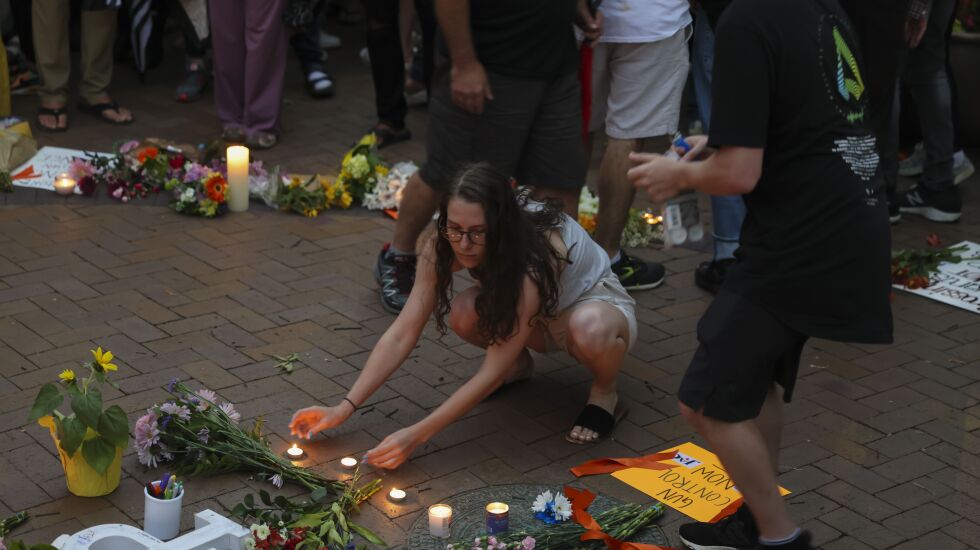
Could the 2022 massacre during Highland Park’s July Fourth parade have been prevented with a small change to state law?
It’s never been publicly reported before, but several local sources confirmed this week that Highland Park Police Chief Louis Jogmen wanted to send a city-owned drone above the parade last year. That camera-equipped drone could’ve spotted Robert Eugene Crimo III on a building rooftop overlooking the parade before he allegedly fired 83 shots that killed seven people and wounded 48 more. But the chief couldn’t launch that drone because of state law.
Jogmen’s police department has for years wanted to launch the camera drone, which the city uses for search-and-rescue and other emergencies, to fly over major public events. But state law prohibits law enforcement agencies from using the drones for things like event surveillance.
In other words, state law allows police to use drones in the aftermath of horrific and deadly mass shootings, but not to safeguard the public before they happen.
“The Illinois Freedom from Drone Surveillance Act was passed in 2014 in an effort to balance evolving technology with important privacy concerns,” explained state Rep. Bob Morgan, D-Deerfield, who was at Highland Park’s Independence Day parade last year. “Nearly 10 years later, it has been unchanged and undeniably stands in the way of law enforcement doing their jobs to keep our communities safe. We need to revisit and amend this law to prevent future mass shootings like what we endured on July Fourth in Highland Park.”
Highland Park and other municipalities are allowed to deploy helicopters with high-tech video and tracking capabilities to surveil events, but not drones. Helicopters are expensive to purchase, operate and maintain and are very noisy (just ask anyone who lives in or near a high-crime area in Chicago how loud they can be). Drones are relatively inexpensive, not difficult to fly and operate almost silently.
The quiet operation of the small drones is part of what worries the American Civil Liberties Union of Illinois. People “could be observed in a host of different places — like the upper floor of a large condo building or one’s backyard — without knowing that any surveillance was taking place,” explained ACLU of Illinois spokesperson Ed Yohnka. “The same is not true for a helicopter and requires law enforcement to, essentially, announce their presence. This announcement could well deter criminal activity.”
Yohnka is right that the loud noise made by helicopters might deter criminal activity (it’s also a very real and obnoxious intrusion on the lives of South and West Side residents at all hours of the day and night). But, again, helicopters are expensive and difficult to fly and maintain. A town of 30,000 people isn’t going to, and likely can’t afford to shell out that kind of money. Even a place as wealthy as Highland Park.
Highland Park City Manager Ghida Neukirch pointed to a bill introduced last year that would’ve allowed police to use the drones for proactive law enforcement. “Had we had the opportunity to use it last July Fourth, it would have provided our employees with an aerial view of the entire parade grounds and rooftops and the entire area,” she said of the drone.
State Sen. Julie Morrison, D-Lake Forest, went further, suggesting that Highland Park’s drone could have prevented the mass killing.
Morrison was just a block away from the site of last year’s parade shooting and she’s involved with the negotiations.
“We’ve been working with law enforcement to tailor a bill that will serve public safety concerns,” Morrison told me last week, adding that she and others have been “meeting on a daily basis” to find a fix for the state’s drone laws.
Chicago has its own drone rules, and is reportedly skittish about any state law changes that could alter them.
“It’s an important issue to me,” Morrison said. She said giving the police the ability to use drones in a more proactive sense, “could have prevented the shooting in Highland Park.”
The General Assembly passed sweeping legislation to ban assault weapons after the Highland Park shooting. But, so far, those are just words on paper as court challenges to the law work their way through the system.
People should have the right to attend public events without nervously scanning unprotected rooftops, or worse. Nobody is talking about giving the police unregulated and unfettered access to drones. Nobody is talking about blocking Chicago’s drone program. It is time to come to an agreement.
Rich Miller also publishes Capitol Fax, a daily political newsletter, and CapitolFax.com.
The Sun-Times welcomes letters to the editor and op-eds. See our guidelines.







